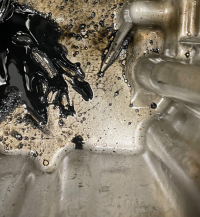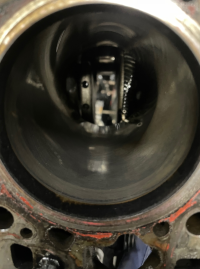All right, a follow-up. I post it here in case this is helpful or anyone sees any red flags in the communications with VW... It is a 204 BiTurbo 4 motion LWB T6 with a CXEB engine and about 65000 miles. I noticed an increase in oil consumption in August while driving back from France but did not make much of it. I had to top up 1 later in the middle of a long trip I do yearly. Normally I only have to top up at the end of it, and only 05l or so (it is over a 2500-mile road trip). Frustratingly, this was while the van was still under extended warranty, but I did not think much of it and I did not raise it with VW.... Over Christmas, the oil consumption spiked and I got multiple adblue errors. After roughly 200 miles of driving, the van would ask for adblue and start a count down from 600 miles, only to reset itself after a while. As I was abroad, I did not bring it to the garage. I did so once I was back in the UK (and out of warranty....). I drove the van for 623 miles for the oil consumption test. This is a copy of their email...When you take it into VW , take a copy of the TPI above .
Tell them you know about the engine wear issue with the cxeb engine.
They will start with an oil test, Same as they done with me.
Have you got your own logs?. As to when and how much oil you topped up with?.... That will help.
Then if it fails the oil test they need to do a compression test.... To see if it's the block or turbo.
Low compression on block is new engine, dpf,cat, sensor.
Good compression will likely mean further investigation on the turbo.... Most likely turbo,dpf,cat,sensor.
Keep us posted with what happens.
"The results were that it only just passed from an oil level measurement but in the time since your last visit, we have found that the regeneration of the DPF was cancelled 4 times. This means that fuel would have gone into the oil raising the level. This means that the reading we took would not be correct and this means the vehicle has failed the oil consumption tests.
We believe that the oil is passing the piston and con rods causing the excessive use of the oil. With this in mind, the repair required to resolve this would be to replace the engine, catalytic converter, diesel particulate filter and lambda probes.
I have attached an estimate for the full costs of this. As your All In warranty expired 04/12/2024 we are unable to claim against this. However we have approached VW UK regarding the repair and they are prepared to cover the cost of 80% of the parts cost but cannot cover any more than this.
This means that you would be liable for the cost of 20% of the parts and the full cost of labour. As a result, the total cost to you with this discount would be £6279.02 including VAT."
So with that, we can add my van to the list of failed CXEB engines... The total cost they gave in the email is around 17k, so 6k makes it sound like a bargain... quite shocking to see well-looked-after diesel engines fail with this mileage....
Should I query whether the turbo should also be changed?? It seems to be the only part under the bonnet that is not being changed....
The car got a new EGR under the extended warranty last year because the car was losing coolant... I suspect this is unrelated??
I will do a bit of research on this forum for advice on how to make the new engine last, whether that requires blocking EGR or tampering with the DPF... Once the new engine is no longer under warranty, I will consider all avenues....
Thanks, @Dellmassive for the accurate information in this and so many other posts!










